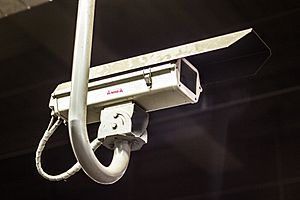Privacy facts for kids
Privacy is about being able to control who knows what about you. It's also about deciding what information you want to share with others and when. Think of it as having your own personal space for your thoughts, feelings, and information.
Many countries have laws about privacy. Some laws protect your privacy, like the U.S. Constitution and the Universal Declaration of Human Rights. These laws help make sure people have the right to keep certain things private. But other laws might ask you to share information. For example, tax laws require people to share income details with the government. Also, companies might ask for your information in exchange for something, like a discount or a service.
Contents
Why Privacy Matters
Privacy is really important for many reasons. It helps you feel safe and secure. When you have privacy, you can develop your own ideas and opinions without feeling watched or judged. It also helps you build trust in your relationships, because you decide what to share with your friends and family.
Personal Safety
Having privacy can help keep you safe. If too much personal information is out there, it could be used by people who want to cause harm. This is why it's important to be careful about what you share online.
Freedom to Be Yourself
Privacy gives you the freedom to be yourself. You can explore your interests, make mistakes, and learn without everyone knowing every detail. It allows you to have a private life away from public view.
Protecting Your Information
Your personal information, like your name, address, and what you like, is valuable. Privacy helps protect this information from being used in ways you don't want, such as for unwanted advertising or even identity theft.
Types of Privacy
Privacy isn't just one thing; it comes in different forms.
Physical Privacy
Physical privacy means having your own space where others can't see or hear you without permission. This could be your bedroom, a private conversation, or even just a quiet moment to yourself.
Information Privacy
Information privacy is about controlling your personal data. This includes things like your name, address, phone number, health records, and what you do online. It's about deciding who can collect, store, and use this information.
Communication Privacy
Communication privacy means your conversations and messages are private. This includes phone calls, emails, and text messages. Laws often protect this type of privacy, making it illegal for others to listen in or read your messages without permission.
Privacy in the Digital Age
In today's world, a lot of our lives happen online. This makes digital privacy super important.
Online Footprint
Every time you go online, you leave an "online footprint." This includes websites you visit, things you post on social media, and even what you search for. This footprint can reveal a lot about you.
Social Media and Apps
When you use social media or apps, you often share a lot of personal information. It's important to check the privacy settings on these platforms. You can often choose who sees your posts, photos, and other details. Be careful about what you share, as it can be hard to take back once it's online.
Data Collection
Many websites and apps collect data about you. They might use this data to show you personalized ads or to understand how people use their services. It's a good idea to read privacy policies to understand what information is being collected and how it's used.
Protecting Your Privacy
There are many things you can do to protect your privacy, especially online.
Before you post something online, ask yourself: "Do I want everyone to see this? Will I be okay with this being online forever?" Once something is on the internet, it's very hard to remove completely.
Use Strong Passwords
Always use strong, unique passwords for your online accounts. This helps protect your information from hackers.
Check Privacy Settings
Regularly check the privacy settings on your social media accounts, apps, and even your phone. You can often control who sees your information and what data is shared.
Be Careful with Public Wi-Fi
Public Wi-Fi networks (like at a coffee shop) are often not very secure. Avoid doing sensitive things like online banking or shopping when using public Wi-Fi, as your information could be at risk.
Understand Privacy Policies
While they can be long, try to understand the privacy policies of the websites and apps you use. They explain how your data is collected and used.
Images for kids
See also
 In Spanish: Privacidad para niños
In Spanish: Privacidad para niños
 | Janet Taylor Pickett |
 | Synthia Saint James |
 | Howardena Pindell |
 | Faith Ringgold |



